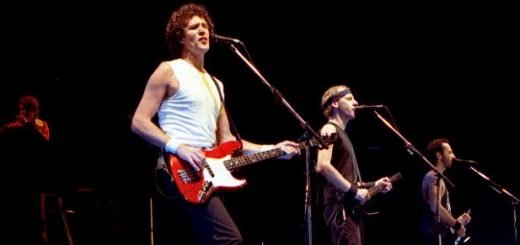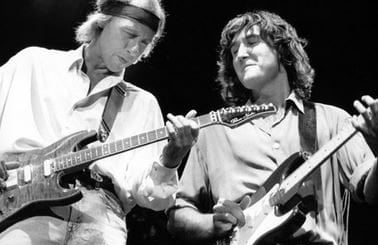Once Upon A Time In The West by Dire Straits Lyrics Meaning – Decoding the Ballad of Modern Outlaws
Lyrics
Scaring the pedestrians for a minute
Crossing up progress driving on the grass
Leaving just enough room to pass
Sunday driver never took a test
Oh yeah, once upon a time in the west
Yes it’s no use saying that you don’t know nothing
It’s still gonna get you if you don’t do something
Sitting on a fence that’s a dangerous course
Oh, you could even catch a bullet from the peace-keeping force
Even the hero gets a bullet in the chest
Oh yeah, once upon a time in the west
Mother Mary your children are slaughtered
Some of you mothers ought to lock up your daughters
Who’s protecting the innocents
Heap big trouble in the land of plenty
Tell me how we’re gonna do what’s best
You guess once upon a time in the west
Oh yeah, once upon a time in the west
Oh yeah, once upon a time in the west
Oh yeah, once upon a time in the west
(Once upon) once upon a time in the west
Once upon a time in the west
Once upon a time in the west
Once upon a time in the west
Once upon a time in the west
Once upon a time in the west
Once upon a time in the west
Once upon a time in the west
Once upon a time in the west
As the haunting harmonica intro of Dire Straits’ ‘Once Upon A Time In The West’ sets the tone, listeners are transported into a world that melds the wild frontier with contemporary society. Mark Knopfler’s ability to craft a narrative that explores more than what meets the eye is what gives this track its timelessness and cultural resonance.
At first glance, the song appears to pay homage to the spaghetti westerns of yore, but a deeper lyrical analysis reveals layers of commentary on modern society’s shortcomings. The track is a ballad of the modern outlaw—not the romanticized gunslinger of Western lore, but the everyday person navigating the complexities of the urban landscape.
Speed Demons and Moral Dilemmas: Unpacking the First Verse
The opening lines draw an immediate juxtaposition between reckless abandon and societal progress, suggesting a conflict between individual thrill-seeking and the collective good. The mocking tone of ‘a cheap laugh’ and the criticism of behavior that disrupts civil development is shot through with irony. It’s clear that Dire Straits is pointing a finger at the sacrificial nature of chasing personal highs at the expense of communal harmony.
As we dwell on the cheeky nod to the ‘Sunday driver,’ it becomes evident that Knopfler isn’t just speaking about literal traffic violations but about the larger theme of responsibility avoidance. Through the lens of western cinema, he’s asking if our societal ‘heroes’ — the ones supposed to set the example — are truly any different from the outlaws they chase.
The Inevitability of Consequence – Verse Two’s Warning
In the second verse, the songstress plays with the inevitability of consequence—an omen that ignoring the problems of the world won’t exempt one from being affected by them. The imagery of sitting on a fence paints a picture of indecision or neutrality that’s deemed a ‘dangerous course.’ The lyric ‘Even the hero gets a bullet in the chest’ flips the script on traditional narratives where the good guys come out unscathed, suggesting vulnerability and a demolished sense of invincibility.
The ‘peace-keeping force’ mentioned is laden with dual meanings. On one level, it could refer to law enforcement, but on another, it could symbolize any entity tasked with maintaining order that can, paradoxically, become a source of harm, particularly when neutrality turns to negligence or complicity.
Innocence Lost: The Song’s Piercing Social Critique
The third verse serves a bleak picture, invoking religious imagery with ‘Mother Mary’ to underscore the sense of abandonment and the need for intervention in a world where ‘children are slaughtered.’ This could reference both literal violence as well as the erosion of innocence through societal failure—economic disparity, broken families, and the victimization of the youth.
Words like ‘heap big trouble’ and ‘land of plenty’ strike chords of sarcasm, presenting the American Dream in a light of contradiction and questioning the nation’s ability to care for its most vulnerable. The line ‘Tell me how we’re gonna do what’s best’ is a call to action, an open-ended question that encourages reflection on societal values and policy.
The Echoes of Mythos – How the Chorus Amplifies the Message
Dire Straits uses the repetition of ‘Oh yeah, once upon a time in the west’ as a chorus to blur lines between fact and folklore. This statement serves as both a reminder of the Old West’s glorified tales and the harsh realities of the present. It reinforces the idea that the ‘times’ we live in are the making of new myths and legends, possibly not too different from the ones we’ve romanticized.
Here, the legend of the ‘West’ becomes an allegory for the current societal landscape, teeming with high stakes, moral conflicts, and the potential for both heroism and villainy in everyday life. The moral ambiguity of a western film is mirrored in the chorus, forcing listeners to question who today’s heroes really are, and what they’re fighting for.
Uncovering the Hidden Meaning: A Reflection on Modern Discontent
While the song wears the clothing of a cowboy ballad, the substance woven into its fabric is rich with contemporary resonance. It emerges as a lament for a society that idolizes the individual at the expense of the collective. ‘Once Upon A Time In The West’ is a reminder that the battles we fight today might not be on horseback or in high-noon showdowns, but in the moral and ethical choices of the everyday citizen.
It’s not just a critique; it’s a cautionary tale reminding us that the ‘Wild West’ hasn’t disappeared—it has evolved, morphed, and is alive in the fabric of modern civilization. It forces the audience to look inward and ask: what role do we play in this narrative? Are we the outlaws, the heroes, or the bystanders? And most importantly, are we ready to take the test that we never took, as the first verse suggests?








